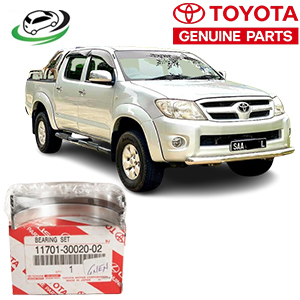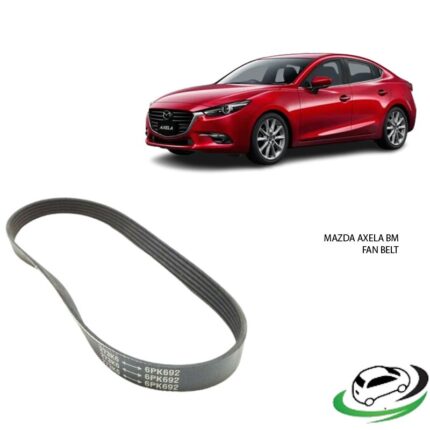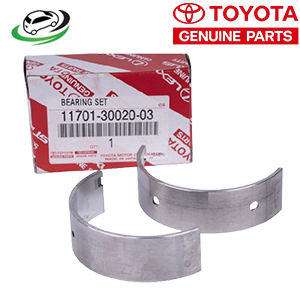-14%
Get Toyota | Hilux Genuine Crankshaft Bearing Shells 11701-30020-03
Crankshaft bearing shells are critical components in internal combustion engines, providing smooth movement and stability for the crankshaft, which transforms the linear motion of the pistons into rotational force. These bearing shells reduce friction, provide support, and ensure the crankshaft operates smoothly within the engine block. Using genuine crankshaft bearing shells, particularly Original Equipment Manufacturer (OEM) parts, is essential to maintain the engine’s performance, reliability, and longevity.
In this guide, we’ll dive into the purpose of crankshaft bearing shells, their materials, the importance of using genuine parts, signs of wear, maintenance tips, and the replacement process.
Function of Crankshaft Bearing Shells
The primary role of crankshaft bearing shells is to reduce friction and support the crankshaft during engine operation. As the crankshaft rotates, the bearing shells ensure it can turn smoothly while reducing the impact of metal-to-metal contact, which would otherwise cause wear and lead to engine failure.
Here are the main functions:
- Friction Reduction: A thin oil film separates the bearing shells from the crankshaft, reducing friction. Without bearing shells, the crankshaft would face direct contact with the engine block, leading to rapid wear.
- Load Distribution: The crankshaft endures high loads from the combustion process. The bearing shells help absorb and distribute these forces evenly, preventing damage to the crankshaft and other engine components.
- Alignment and Stability: Bearing shells ensure that the crankshaft remains aligned and stable within the engine block, maintaining engine efficiency.
- Supporting Rotational Motion: Bearing shells enable the crankshaft to convert the pistons’ linear movement into the rotational energy needed to power the vehicle.
Types of Crankshaft Bearing Shells
Crankshaft bearing shells come in two main types: main bearings and connecting rod bearings. Both are essential for engine operation but differ in function and location.
- Main Bearings:
- These are located between the engine block and the crankshaft’s main journals. Main bearings are responsible for keeping the crankshaft aligned and absorbing the large forces produced during combustion.
- They consist of two half-shells, an upper and lower half, which sit in the main bearing caps and the engine block.
- Main bearings handle axial loads and the weight of the rotating assembly.
- Connecting Rod Bearings:
- These are positioned between the connecting rods and the crankshaft’s rod journals. They allow the connecting rods to pivot and rotate as the pistons move up and down during the combustion cycle.
- Like main bearings, connecting rod bearings also come in two half-shells that are housed in the connecting rods and secured with rod caps.
- They primarily deal with radial loads and the forces generated by piston movement.
Materials Used in Genuine Crankshaft Bearing Shells
The materials used for crankshaft bearing shells are carefully selected to withstand high pressure, temperature, and friction. Genuine bearing shells are often made from multi-layer materials designed to provide strength, wear resistance, and anti-friction properties.
- Bi-Metal Bearings:
- Composition: These bearings consist of a steel backing with a layer of aluminum alloy.
- Properties: Bi-metal bearings offer good fatigue resistance, heat conductivity, and friction reduction, making them ideal for modern, fuel-efficient engines.
- Applications: Bi-metal bearings are commonly used in passenger vehicles due to their lightweight and low friction properties.
- Tri-Metal Bearings:
- Composition: These bearings are made from a steel backing with a copper-lead alloy layer and a thin overlay of lead or tin alloy.
- Properties: Tri-metal bearings provide superior load-carrying capacity, heat resistance, and fatigue resistance, making them suitable for high-performance or heavy-duty engines.
- Applications: These are often found in performance or heavy-duty engines, where the demands for durability and strength are higher.
- High-Performance Bearings:
- Composition: In some high-performance applications, crankshaft bearing shells are coated with specialized polymers or other advanced materials to further reduce friction and improve wear resistance.
- Properties: These bearings are designed for extreme conditions, providing better heat dissipation and strength under heavy loads.
Benefits of Using Genuine Crankshaft Bearing Shells
Opting for genuine crankshaft bearing shells provides several advantages that can directly impact the engine’s reliability and longevity:
- Precision Fit and Compatibility: Genuine parts are manufactured to exact specifications to fit the engine’s crankshaft perfectly. This precision ensures optimal oil clearance, reducing the risk of uneven wear or catastrophic failure.
- Enhanced Durability: OEM bearing shells are made from premium materials that can withstand the high-pressure environment inside an engine. They’re rigorously tested for durability, ensuring long-lasting performance.
- Warranty Protection: Many manufacturers require the use of genuine parts to maintain vehicle warranties. Using counterfeit or inferior parts may void your warranty and lead to costly repairs.
- Optimal Performance: Genuine bearing shells maintain the proper clearance between the crankshaft and the engine block, ensuring smooth operation and reduced friction. This translates to better fuel efficiency, lower emissions, and improved engine power.
- Reliability: OEM crankshaft bearing shells are designed and tested to work perfectly in specific engines, providing peace of mind in terms of reliability and performance.
Signs of Worn or Damaged Crankshaft Bearing Shells
Like any engine component, crankshaft bearing shells are subject to wear over time. If they fail, it can result in severe engine damage. Recognizing the signs of worn bearings can help prevent catastrophic failure.
- Engine Knocking Sounds: One of the earliest signs of worn bearing shells is a knocking noise from the engine, especially when it’s cold or under load. This is caused by excessive clearance between the crankshaft and bearings.
- Low Oil Pressure: As the bearings wear out, the oil clearance increases, leading to lower oil pressure. An illuminated oil pressure warning light should never be ignored, as it could indicate bearing issues.
- Metal Shavings in Oil: If you find metal particles in the engine oil during oil changes, it’s a clear sign that the bearing shells are wearing down. These metal shavings indicate that the bearings and possibly the crankshaft are being damaged.
- Excessive Vibration: Worn bearings can cause misalignment of the crankshaft, resulting in increased vibration throughout the engine.
- Poor Engine Performance: As the bearings wear out, the crankshaft may not rotate as smoothly, resulting in reduced engine power, rough idling, and poor acceleration.
Maintenance Tips for Crankshaft Bearing Shells
To ensure the longevity of your crankshaft bearing shells, regular maintenance is key. Proper care can prevent premature wear and ensure the smooth operation of the engine.
- Regular Oil Changes: Engine oil lubricates the bearings and prevents direct contact between the crankshaft and the bearing shells. Regular oil changes with high-quality oil reduce the chances of contamination and ensure proper lubrication.
- Use High-Quality Oil Filters: A good oil filter will trap debris and contaminants before they reach the bearing surfaces. Replacing oil filters during oil changes ensures the oil remains clean and free of harmful particles.
- Monitor Oil Pressure: Always keep an eye on the oil pressure gauge or warning lights. Consistently low oil pressure can indicate that the bearing clearance is increasing due to wear.
- Avoid Engine Overheating: High temperatures can break down oil and reduce its lubricating properties, increasing friction and wear on the bearing shells. Always ensure the engine cooling system is working properly.
- Routine Inspections: During major engine services, it’s wise to inspect the crankshaft and bearings for any signs of wear. If you notice abnormal wear patterns or excessive play, it may be time to replace the bearing shells.
Replacement Process of Crankshaft Bearing Shells
Replacing crankshaft bearing shells is a complex job that requires engine disassembly. Here’s a general overview of the process:
- Engine Disassembly: Begin by removing the engine components necessary to access the crankshaft, including the oil pan, timing components, and possibly the cylinder head.
- Inspect the Crankshaft: Check the crankshaft journals for wear or damage. If they are damaged, the crankshaft may need to be machined or replaced.
- Remove the Old Bearing Shells: Carefully remove the bearing caps and old bearing shells, noting their orientation.
- Install the New Bearing Shells: Clean the bearing surfaces, apply a light coat of assembly lubricant, and install the new bearing shells. Ensure that the new shells are aligned correctly.
- Reassemble the Engine: Reinstall the bearing caps, ensuring that they are torqued to the manufacturer’s specifications. Reassemble the rest of the engine and fill it with fresh oil.
Conclusion
Genuine crankshaft bearing shells are crucial to the smooth and reliable operation of an engine. They reduce friction, support the crankshaft, and maintain proper alignment. Using OEM bearing shells ensures that the engine performs at its best, offering durability, precision fitment, and enhanced reliability. Regular maintenance and timely replacement of worn bearings will help prevent engine failure and prolong the lifespan of your vehicle’s engine.
Follow us on Facebook for more parts.




Reviews
Clear filtersThere are no reviews yet.